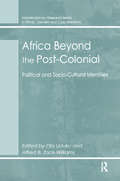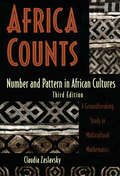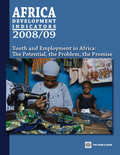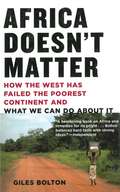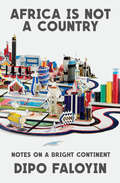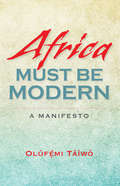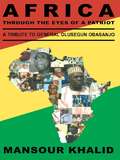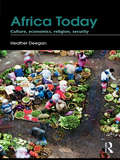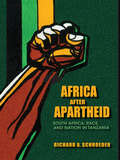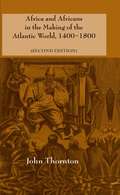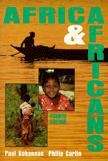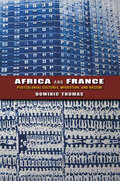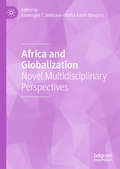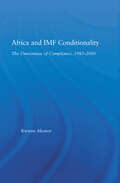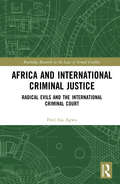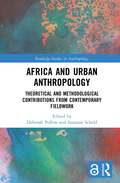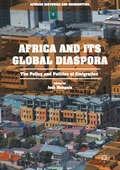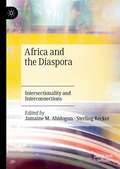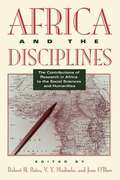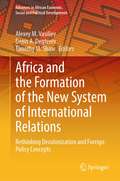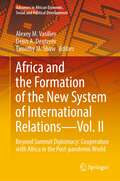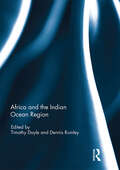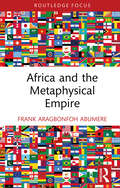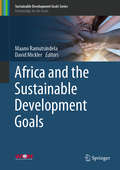- Table View
- List View
Africa Beyond the Post-Colonial: Political and Socio-Cultural Identities (Interdisciplinary Research Series in Ethnic, Gender and Class Relations)
by Alfred B. Zack-WilliamsThe poor economic performance of some African countries since independence has been a major concern to both African leaders and policy makers. This volume, which draws together contributions from academics based in Africa and its diaspora, situates the continent within its historic and socio-political background: from the 1960s, the decade of independence, through to its development outlook as the new millennium unfolds. It examines a broad range of contemporary issues -- from development and culture to linguistics and is unique in identifying and examining issues that are common both to Africa and the diaspora.
Africa Counts: Number and Pattern in African Cultures
by Claudia ZaslavskyThis fascinating study of mathematical thinking among sub-Saharan African peoples covers counting in words and in gestures; measuring time, distance, weight, and other quantities; manipulating money and keeping accounts; number systems; patterns in music, poetry, art, and architecture; and number magic and taboos. African games such as mankala and elaborate versions of tic-tac-toe show how complex this thinking can be. An invaluable resource for students, teachers, and others interested in African cultures and multiculturalism, this third edition is updated with an introduction covering two decades of new research in the ethnomathematics of Africa.
Africa Development Indicators 2008/09
by World BankAfrica Development Indicators 2008/09 (ADI) provides the most detailed collection of data on Africa available in one volume. It puts together data from different sources, making it an essential tool for policy makers, researchers, and other people interested in Africa. This year's ADI addresses the issue of youth employment. The report shows that success in addressing youth employment in will not be achieved and sustained through fragmented and isolated interventions. Instead it finds that an arching guideline for addressing the youth employment challenge is the need for an integrated strategy for rural development, growth and job creation - which covers the demand and the supply sides of the labor market and takes into account the youth mobility from rural to urban areas - combined with targeted interventions to help young people overcome disadvantages in entering and remaining in the labor market. This edition includes the Africa Development Indicators 2008/09 Single User CD-ROM and opening articles from leading economists reporting and analyzing key African economic and development issues.
Africa Doesn't Matter: How the West Has Failed the Poorest Continent and What We Can Do About It
by Giles BoltonWhat happens to the billions of aid dollars given yearly? Why do trade rules that fail African countries also cost us at the checkout line? Why don't the African people matter? In this engaging, jargon-free, reader-friendly guide, longtime aid worker and diplomat Giles Bolton offers his radical analysis of the problems Africa faces, drawing on years of first-hand experience on the ground. Bolton illustrates how the needs of African states exceed their budgets, leaving a gap for aid to fill; how the way Western aid is delivered renders it largely ineffective; and how trade rules and globalization have worked against African development.
Africa Is Not a Country: Notes On A Bright Continent
by Dipo FaloyinA Literary Hub Most Anticipated Book of 2022 An exuberant, opinionated, stereotype-busting portrait of contemporary Africa in all its splendid diversity, by one of its leading new writers. So often, Africa has been depicted simplistically as a uniform land of famines and safaris, poverty and strife, stripped of all nuance. In this bold and insightful book, Dipo Faloyin offers a much-needed corrective, weaving a vibrant tapestry of stories that bring to life Africa’s rich diversity, communities, and histories. Starting with an immersive description of the lively and complex urban life of Lagos, Faloyin unearths surprising truths about many African countries’ colonial heritage and tells the story of the continent’s struggles with democracy through seven dictatorships. With biting wit, he takes on the phenomenon of the white savior complex and brings to light the damage caused by charity campaigns of the past decades, revisiting such cultural touchstones as the KONY 2012 film. Entering into the rivalries that energize the continent, Faloyin engages in the heated debate over which West African country makes the best jollof rice and describes the strange, incongruent beauty of the African Cup of Nations. With an eye toward the future promise of the continent, he explores the youth-led cultural and political movements that are defining and reimagining Africa on their own terms. The stories Faloyin shares are by turns joyful and enraging; proud and optimistic for the future even while they unequivocally confront the obstacles systematically set in place by former colonial powers. Brimming with humor and wit, filled with political insights, and, above all, infused with a deep love for the region, Africa Is Not a Country celebrates the energy and particularity of the continent’s different cultures and communities, treating Africa with the respect it deserves.
Africa Must Be Modern
by Olúfemi TáíwòIn a forthright and uncompromising manner, Olúfémi Táíwò explores Africa's hostility toward modernity and how that hostility has impeded economic development and social and political transformation. What has to change for Africa to be able to respond to the challenges of modernity and globalization? Táíwò insists that Africa can renew itself only by fully engaging with democracy and capitalism and by mining its untapped intellectual resources. While many may not agree with Táíwò's positions, they will be unable to ignore what he says. This is a bold exhortation for Africa to come into the 21st century.
Africa Through The Eyes Of A Pat
by KhalidGeneral Olusegun Obasanjo was recently elected president in the first Nigerian free and popular elections held after fifteen years of military rule. Having voluntarily given over his power to civilians in 1979, Obasanjo has since dedicated himself to Pan-Africanism, conflict resolution in Africa, and regional and international cooperation. "Africa Through the Eyes of a Patriot" is a collection of his most memorable speeches from the 1980s to the present, touching on issues as varies as democracy and policy-making to human rights and the environment.
Africa Today: Culture, Economics, Religion, Security
by Heather DeeganIn the post 9/11 global environment Africa is standing at a crossroads in international affairs as the combined issues of politics, religion and security attract renewed interest. While some countries seem to be moving forward with greater levels of confidence, democracy and stability, others continue to be mired in conflict, poverty and religious/ethnic division. This text focuses on key contemporary issues that the continent faces, providing a comprehensive introduction of current political, religious, developmental and security concerns. Features include: Individual chapters devoted to key issues including health, gender, corruption, religion and the newly emerging problems of human security. Case studies and detailed analysis of topical issues, including: Muslim/Christian clashes: Kano, Northern Nigeria Conflict, Arms and Reconstruction: Darfur and Sierra Leone Comprehensive range of countries discussed including: Zimbabwe, Botswana, Kenya Ethiopia, Uganda, Lesotho, Somalia, Namibia and Madagascar. Fully up-to-date statistics including primary research based on interviews conducted by the author, providing data for both individual countries and the continent as a whole. Boxed descriptions explaining clearly the ideas in important subject areas, such as Islamic law and society By drawing on the author’s empirical research and situating discussion within the context of wider debate, Africa Today is designed both to introduce and to develop a deeper understanding of this rapidly changing continent an essential text for all students of African politics and International Relations.
Africa after Apartheid: South Africa, Race, and Nation in Tanzania
by Richard A. SchroederTracing the expansion of South African business into other areas of Africa in the years after apartheid, Richard A. Schroeder explores why South Africans have not always made themselves welcome guests abroad. By looking at investments in Tanzania, a frontline state in the fight for liberation, Schroeder focuses on the encounter between white South Africans and Tanzanians and the cultural, social, and economic controversies that have emerged as South African firms assume control of local assets. Africa after Apartheid affords a penetrating look at the unexpected results of the expansion of African business opportunities following the demise of apartheid
Africa and Africans in the Making of the Atlantic World, 1400-1800
by Edmund Burke Michael Adas Philip D. Curtin John ThorntonThis 1998 book explores Africa's involvement in the Atlantic world from the fifteenth century to the eighteenth century. It focuses especially on the causes and consequences of the slave trade, in Africa, in Europe, and in the New World. African institutions, political events, and economic structures shaped Africa's voluntary involvement in the Atlantic arena before 1680. Africa's economic and military strength gave African elites the capacity to determine how trade with Europe developed. Thornton examines the dynamics of colonization which made slaves so necessary to European colonizers, and he explains why African slaves were placed in roles of central significance. Estate structure and demography affected the capacity of slaves to form a self-sustaining society and behave as cultural actors, transferring and transforming African culture in the New World.
Africa and Africans in the making of the Atlantic world, 1400-1800
by John ThorntonThis book explores Africa's involvement in the Atlantic world from the fifteenth through the eighteenth centuries. It focuses especially on the causes and consequences of the slave trade, in Africa, in Europe, and in the New World. Prior to 1680, Africa's economic and military strength enabled African elites to determine how trade with Europe developed. Thornton examines the dynamics that made slaves so necessary to European colonizers. He explains why African slaves were placed in significant roles. Estate structure and demography affected the capacity of slaves to form a self-sustaining society and behave as cultural actors. This second edition contains a new chapter on eighteenth century developments.
Africa and Africans, 4th Edition
by Paul Bohannan Philip CurtinAfrica and Africans keeps a watchful eye on what has happened in Africa and on what has happened in the rest of the world that shapes how people look at Africa. The world's perception of Africa is an entanglement of myth and reality--both reflecting and changing with the times. This highly informative yet concise volume, written by two authors intimately familiar with Africa, presents the facts about African society--past and present. Readers wishing to explore Africa's historical events and rich traditions will discover that Africans want to keep what they value in their old way of life as they find themselves in an emerging global culture.
Africa and France: Postcolonial Cultures, Migration, And Racism (African Expressive Cultures)
by Dominic ThomasThis stimulating and insightful book reveals how increased control over immigration has changed cultural and social production in theater, literature, and even museum construction. Dominic Thomas's analysis unravels the complex cultural and political realities of long-standing mobility between Africa and Europe. Thomas questions the attempt to place strict limits on what it means to be French or European and offers a sense of what must happen to bring about a renewed sense of integration and global Frenchness.
Africa and Globalization: Novel Multidisciplinary Perspectives
by Abdul Karim Bangura Kelebogile T. SetiloaneThis edited volume examines the challenges of globalization in light of the need to revisit and reconceptualize the notion of Pan-Africanism. The first part of the book examines globalization and Africa’s socioeconomic and political development in this century by using the Diopian Pluridisciplinary Methodology. This approach is imperative because the challenges faced by Africa vis-à-vis globalization and socioeconomic development are so multiplexed that no single disciplinary approach can adequately analyze them and yield substantive policy recommendations. The chapters in the second part analyze the imperatives for Africa’s global knowledge production, development, and economic transformation in the face of the pressures of globalization. Part two demonstrates an urgent need for Africa’s significant participation in the global knowledge economy in order to meet the continent’s modern transformation and development aspirations. The final part examines lessons from old and new Pan-Africanism and how they can be utilized to deal with the challenges emanating from the forces of modern globalization. With its multidisciplinary approach to a wide range of pressing, modern issues for the African content, this book is essential reading for scholars across the social sciences interested in where Africa is now and where it should go in this increasingly globalized world.
Africa and IMF Conditionality: The Unevenness of Compliance, 1983-2000 (African Studies)
by Kwame AkonorGhana was one of the first African countries to adopt a comprehensive IMF reform program and the one that has sustained adjustment longest. Yet, questions of Ghana's compliance - to what extent did it comply, how did it manage compliance, what patterns of non-compliance existed, and why? - have not been systematically investigated and remain poorly understood. This book argues that understanding the domestic political environment is crucial in explaining why compliance, or the lack thereof, occurs. Akonor maintains that compliance with IMF conditionality in Ghana has had high political costs and thus, non-compliance occurred once the political survival of a regime was at stake.
Africa and International Criminal Justice: Radical Evils and the International Criminal Court (Routledge Research in the Law of Armed Conflict)
by Fred Aja AgwuThis book provides an overview of crimes under international law, radical evils, in a number of African states. This overview informs a critical analysis of the debates surrounding the African Union’s call for withdrawal from the International Criminal Court and proposes a way forward with a more pertinent role for the Court. The work critically analyzes the arguments around withdrawal from the ICC and the extension of the jurisdiction of the African Court into criminal matters. It is held that this was not intended in the spirit of complementarity as envisaged by the Rome Statute, and is subject to political calculation and manipulation by national governments. Recasting the ICC as a court of second instance would provide a stronger institutional and jurisdictional regime. The book will be a valuable resource for students, academics, and policymakers working in the areas of international humanitarian law, international criminal law, African studies, and genocide studies.
Africa and Urban Anthropology: Theoretical and Methodological Contributions from Contemporary Fieldwork (Routledge Studies in Anthropology)
by Deborah Pellow Suzanne ScheldThis volume offers valuable anthropological insight into urban Africa, covering a range of cities across a continent that has become one of the fastest urbanizing geographic areas of the globe. Consideration is given to the structures, social formations, and rhythms that constitute the definition of an African city, town, or urban space, and to current concepts for thinking about African cities in the twenty-first century. The contributors examine topics including notions of belonging, the effects of globalization, colonialism, and transnationalism on African urban life, the cultural dimensions of infrastructure and public resources, mobility, labor issues, spatial organization, language, and popular culture trends, among other themes. The book reflects on how the ethnography of urban Africa fits within anthropology and urban studies, and on new theoretical concepts and methodologies that can be created through anthropological fieldwork in African cities. It will be of particular interest to scholars and students from anthropology, African studies and urban studies, as well as sociology and geography.
Africa and its Global Diaspora: The Policy and Politics of Emigration (African Histories and Modernities)
by Jack MangalaThe book presents a thorough study of the changing landscape of state-diaspora relations in Africa, as well as a robust analysis of diaspora engagement policies being pursued across the continent. As the Africa diaspora strengthens its socio-economic and political clout, countries of origin in Africa have sought to engage their citizens living abroad. Over the past decade, the role of diaspora in the homeland development has become a core tenet of national strategies and policies. Against the backdrop of expanding globalization and deepening regional integration, the book presents a thorough study of the changing landscape of state-diaspora relations in Africa, as well as a robust analysis of diaspora engagement policies being pursued across the continent as states seek to extend rights to and extract obligations from their global citizens.
Africa and the Diaspora: Intersectionality and Interconnections
by Jamaine M. Abidogun Sterling ReckerThis edited volume presents intersectionality in its various configurations and interconnections across the African continent and around the world as a concept. These chapters identify and discuss intersectionalities of identity and their interplay within precolonial, colonial, and neo-colonial constructs that develop unique and often conflicting interconnections. Scholars in this book address issues in cultural, feminist, Pan African, and postcolonial studies from interdisciplinary and traditional disciplines, including the Arts, Humanities, and Social Sciences. While Intersectionality as a framework for race, gender, and class is often applied in African-American studies, there is a dearth of work in its application to Africa and the Diaspora.This book presents a diverse set of chapters that compare, contrast, and complicate identity constructions within Africa and the Diaspora utilizing the social sciences, the arts in film and fashion, and political economies to analyze and highlight often invisible distinctions of African identity and the resulting lived experiences. These chapters provide a discussion of intersectionality’s role in understanding Africa and the Diaspora and the intricate interconnections across its people, places, history, present, and future.
Africa and the Disciplines: The Contributions of Research in Africa to the Social Sciences And Humanities
by Robert H. Bates V. Y. Mudimbe Jean F. O'BarrAfrican Studies, contrary to some accounts, is not a separate continent in the world of American higher education. Its intellectual borders touch those of economics, literature, history, philosophy and art; its history is the story of the world, both ancient and modern. This is the clear conclusion of Africa and the Disciplines, a book that addresses the question: Why should Africa be studied in the American university?
Africa and the Formation of the New System of International Relations: Rethinking Decolonization and Foreign Policy Concepts (Advances in African Economic, Social and Political Development)
by Timothy M. Shaw Alexey M. Vasiliev Denis A. DegterevThis book discusses the prospects for the development of the African continent as part of the emerging system of international relations in the twenty-first century. African countries are playing an increasingly important part in the current system of international relations. Nevertheless, even 60 years after gaining their independence, most of them are confronted with regional and global issues that are directly related to their colonial past and its influence. Due to Africa’s wealth of natural and geopolitical resources, the possibility of interference in the internal affairs of African countries on the part of new and traditional global actors remains very real. Leading Africanists, together with international scholars from both international relations and African studies, examine the experience of decolonization, the impact of the emergence of a unipolar world on the African continent, and the growing influence of new international actors on the African continent in the twenty-first century. In addition, the importance of African countries’ foreign policy concepts and ideological attitudes in the post-bipolar period is revealed. “This volume strengthens the intellectual bridge between Russian, African and Western scholars of international relations. Strongly recommended!” Vladimir G. Shubin, Institute for African Studies, Russian Academy of Sciences “This book presents a wide range of prominent global scholars who bring a wealth of knowledge on the subject of Africa and the world.” Gilbert Khadiagala, Jan Smuts Professor of International Relations and Director of the African Centre for the Study of the USA (ACSUS) at the University of the Witwatersrand, Johannesburg, South Africa. “As a genuine contribution to the field of international relations and Global South Agency, this book should be in every institution of higher education’s library.” Lembe Tiky, Director of Academic Development, International Studies Association.
Africa and the Formation of the New System of International Relations—Vol. II: Beyond Summit Diplomacy: Cooperation with Africa in the Post-pandemic World (Advances in African Economic, Social and Political Development)
by Timothy M. Shaw Alexey M. Vasiliev Denis A. DegterevIn light of the growing number of African summits and a new awareness of international interdependence during the COVID-19 pandemic, this book provides a comprehensive analysis of the current state of Africa’s international relations (IR). Leading IR scholars from Africa and around the world examine international cooperation with African countries in areas such as health care, education, and peacekeeping and explore how Africa’s role in the system of international relations has changed during the COVID-19 pandemic.The book is divided into four parts, the first of which explores analyzes the various actors that constitute African agency in the post-pandemic world, while the second focuses on the summits of the major powers regarding cooperation with Africa. The third part covers public health cooperation and regional initiatives in Africa, including issues such as vaccine diplomacy, while the fourth and final part discusses conflicts & political process despite COVID Pandemics.
Africa and the Indian Ocean Region
by Timothy Doyle Dennis RumleyThis book examines the presence of Africa as a significant force in the western Indian Ocean. Africa will increasingly play a pivotal role in the future of the geopolitics of the Indian Ocean region. The book considers the scope for greater African involvement in Indian Ocean region-building activities, and seeks to encourage a western Indian Ocean dialogue. The book publishes some of the best papers presented at an Indian Ocean Research Group (IORG Inc.) symposium held in Nairobi, Kenya, in 2013, entitled "The Political Economy of Maritime Africa in the Indian Ocean Region." This symposium was part of a larger project on constructing a sense of "Indian Oceanness". Chapters include: India’s new policy of engagement with Africa; China’s growing presence in the Indian Ocean Region; security strategies in the Western Indian Ocean; the increasing importance and significance of the Western Indian Ocean littoral; and cultural linkages between Africa and the Indian Ocean region. This book was previously published as a special issue of the Journal of the Indian Ocean Region.
Africa and the Metaphysical Empire (Routledge Studies in African Philosophy)
by Frank Aragbonfoh AbumereThis book investigates whether African cultures can appropriate some useful aspects of Western cultures, or whether doing so risks falling into the metaphysical empire and diluting African identity.Ngugi wa Thiong’o and Ndlovu-Gatsheni characterise the metaphysical empire as an intangible non-physical and non-geographical invasion of the mental universe of formerly colonised peoples. As mutual exclusivists, they argue that authentic decolonization necessitates a complete dissociation of the African and her culture from colonial heritage. However, cultural appropriationists such as Wole Soyinka, Chinua Achebe and Chimamanda Ngozi Adichie argue that the African adoption of colonial heritage such as the English language is in no way antithetical to decolonization. This book delves into the debate by exploring the strengths and weaknesses of cultural appropriationism and, on the other hand, testing the validity of mutual exclusivism. The book demonstrates that cultural appropriation without falling into the metaphysical empire is possible, but that this poses important questions about the nature of the decolonization project itself, and where it should start and stop. A more accommodative decolonization would recognize the relationship between cultural universals and particulars, whilst also creating room for cultural appropriation. Ultimately, the book argues that both cultural appropriationists and mutual exclusivists must simultaneously renounce absolutism. By being amenable to a fusion of horizons, discourse can move beyond the decolonization fallacy of arguing that things are always either/or.This original and important contribution to the metaphysical empire debate will be a seminal read for researchers across the fields of philosophy, political science, African studies, and Black studies.
Africa and the Sustainable Development Goals (Sustainable Development Goals Series)
by Maano Ramutsindela David MicklerThe book draws upon the expertise and international research collaborations forged by the Worldwide Universities Network Global Africa Group to critically engage with the intersection, in theory and practice, of the Sustainable Development Goals (SDGs) and Africa’s development agendas and needs. Further, it argues that – and demonstrates how – the SDGs should be understood as an aspirational blueprint for development with multiple meanings that are situated in dynamic and contested terrains. As the SDGs have substantial implications for development policy and resourcing at both the macro and micro levels, their relevance is not only context-specific but should also be assessed in terms of the aspirations and needs of ordinary citizens across the continent. Drawing on analyses and evidence from both the natural and social sciences, the book demonstrates that progress towards the SDGs must meet demands for improving human well-being under diverse and challenging socio-economic, political and environmental conditions. Examples include those from the mining industry, public health, employment and the media. In closing, it highlights how international collaboration in the form of research networks can enhance the production of critical knowledge on and engagement with the SDGs in Africa.
